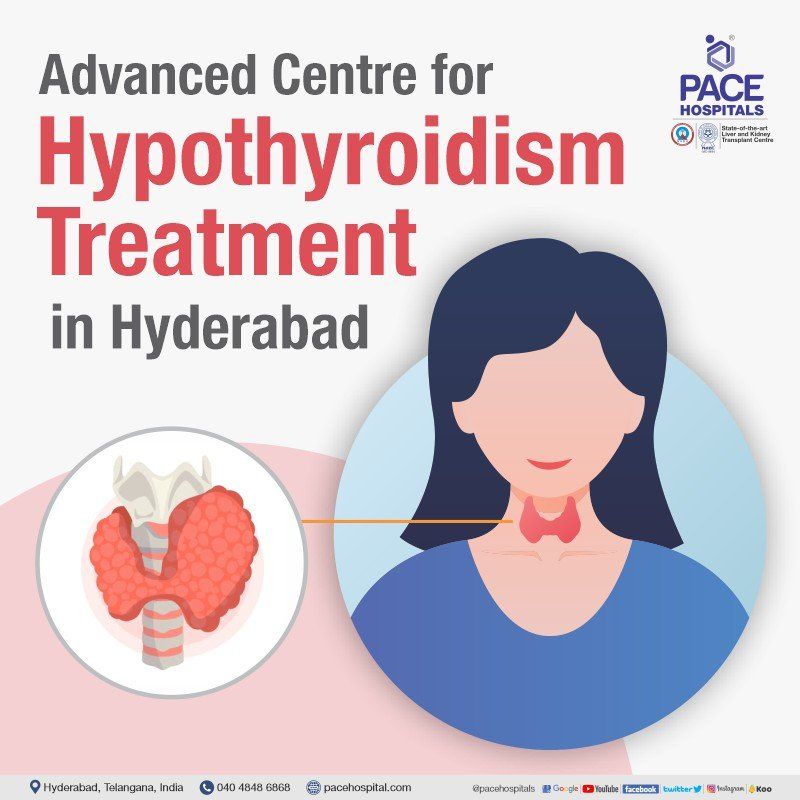Hypothyroidism Treatment - Thyroid Hormone Replacement Therapy & Cost
PACE Hospitals is one of the Best Thyroid Specialist Hospital in Hyderabad offering tested and proven thyroid hormone replacement therapy for women, men and children. Our team of thyroid doctors including paediatrician are experienced in handling even the most complicated cases of thyroid problems.
Get Rid of Thyroid Problems. Request an appointment.
Hypothyroidism Treatment - appointment
Why Choose PACE Hospitals for Hypothyroidism Treatment?

More than 45,000 patients treated with thyroid problems
Team of the best thyroid specialist doctor with 20+ years of expertise
Hypothyroidism Diagnosis
It is critical to diagnose an underactive thyroid (hypothyroidism) as soon as possible. Low levels of thyroid hormones like triiodothyronine (T3) and tetraiodothyronine (T4) can alter how the body processes fat. This can result in high cholesterol and atherosclerosis (artery clogging), which can lead to serious heart problems such as angina and heart attack.
The physician might consider the following to diagnose the condition.
- Patient’s medical and family history
- Presence of hypothyroidism in the patient’s family (hereditary)
- Previous thyroid surgery (thyroidectomy)
- Previous radiation to the patient’s neck as a cancer treatment.
- Any usage of medication that triggers hypothyroidism
- Any changes in the overall health
Physical exam: The physician will look for signs in addition to the patient's symptoms and medical history.
- Preorbital puffiness
- Dry skin
- Non-pitting oedema
- Decreased heart rate
- Dry coarse hair or alopecia
- Delayed relaxation phase, deep tendon reflex
Blood test: A blood test is the gold standard for diagnosing hypothyroidism. Thyroid Function Tests including Thyroid-stimulating hormone (TSH), T3 and T4 levels are used to diagnose hypothyroidism. The risk and diagnosis will be determined based on their levels.
- A high TSH level, a low T4 level and a low T3 level in the blood could indicate an underactive thyroid.
- If the patient’s TSH levels are elevated but T4 levels are normal, the patient may be at risk of developing an underactive thyroid.
Why high TSH and low T4 levels in hypothyroidism?
Thyroid-stimulating hormone (TSH) is secreted into the bloodstream by the pituitary gland, where it reaches the thyroid gland and produces the same amount of T4. In the case of hypothyroidism, there will be a decrease in T4 (tetraiodothyronine) production by the thyroid gland, resulting in increased synthesis of thyroid-stimulating hormone in the blood to meet the body requirement. This raises TSH levels in the blood.
Free T4 and Free T4 index: These are the two simple blood tests which are used to determine the function of the thyroid gland.
In some cases, the physician will look for thyroid antibody test to confirm the presence of Hashimoto's thyroiditis (an autoimmune thyroid condition), hyperthyroidism (overactive thyroid) and blood triiodothyronine (t3) levels.
Thyroid Function Test Normal Values
| S.No | Name of the test | Normal range |
|---|---|---|
| 1 | Thyroid-stimulating hormone (TSH) | 0.3 - 4.5 IU/mL |
| 2 | Total T4 (Tetraiodothyronine) | 3.5 - 12.5 ug/dl |
| 3 | Free T4 (Tetraiodothyronine) | 8.9 - 17.2 pg/ml |
| 4 | Total T3 (Triiodothyronine) | 0.72 - 2.02 ng/ml |
| 5 | Free T3 (Triiodothyronine) | 2.0 - 4.2 pg/ml |
| 6 | Free thyroxine index (FT4I) | 1.0 - 4.3 units |
| 7 | Antithyroglobulin antibody (Anti TG) | 0 - 18 IU/ml |
| 8 | Anti-thyroid peroxidase (Anti-TPO) | 0 - 8 IU/ml |
Treatment of Hypothyroidism
To have a proper management of hypothyroidism, the patient needs to adhere the following:
- The patient should visit the physician on a consistent basis.
- The patient should make sure that, if he is on calcium or iron supplements, thyroid medication should be taken at least an hour before breakfast or wait at least three hours after eating or taking calcium or iron supplements at bedtime.
The patient should inform their concerned physician about:
- The intake of thyroid medication before starting any medication for treating other diseases, as thyroid hormone therapy dosage may need to be adjusted when treating certain conditions or diseases.
- If the patient is pregnant.
- Occurrences of any new symptoms
- Any inconsistency in dosage intake
Thyroid hormone replacement therapy is an effective treatment for hypothyroidism. The most common replacement for thyroid hormone is a synthetic form of thyroxine (T4). The physician might adjust the dose of therapy periodically based on the results of TSH and T4 blood tests and weight, the causes of hypothyroidism, old age, and usage of other medications.
Weight: The greater the body weight, the more the dose will be prescribed.
Causes of hypothyroidism: The dose will be prescribed based on the causative factors:
- If the patient has autoimmune disease with some T4 production, the patient needs a low dose of synthetic thyroxine, as the patient’s thyroid is making some T4.
- If the patient’s thyroid has been removed, the patient’s T4 must be replaced with synthetic thyroxine.
- If the patient is suffering from thyroid cancer, the patient may require more synthetic thyroxine in order to maintain TSH levels in the blood and prevent reoccurrence.
Old age: If a patient is elderly, they should begin treatment at a low dose and gradually increase it so that their body, and especially their heart, can adjust to it. In addition to this, drug clearance decreases with age, so elderly patients typically continue on lower doses.
Usage of other medication:
- The patient might require a higher dose, if he/she is on birth control pills, hormone replacement therapy, antidepressants, anti-seizure or anticonvulsant, proton pump inhibitor medications and dietary supplements such as calcium, iron.
- The patient might require a low dose, if the patient is taking testosterone or niacin (vitamin B3).
Treatment of Myxedema coma (severe hypothyroidism)
Traditionally, immediate and aggressive therapy with 300 to 500 mcg IV bolus levothyroxine will be prescribed.
- In addition to this, intravenous glucocorticoid therapy (hydrocortisone 100 mg) will be administered every 8 hours until coexisting adrenal suppression is ruled out.
- Within 24 hours, consciousness, lower TSH concentrations, and improvements in vital signs are expected.
- Oral therapy will be initiated, once the patient stabilises with intravenous levothyroxine maintenance therapy (75 to 100 mcg).
Side effects of Thyroid Hormone Replacement Therapy
Serious side effects are uncommon if dosing is correct and the patient is closely monitored during the first few weeks of treatment.
In patients with athyrotic hypothyroidism, side effects of the synthetic form of thyroxine are:
- It increases the frequency of atrial premature beats.
- Excessive doses of thyroid hormone can lead to:
- Heart failure
- Angina pectoris
- Myocardial infarction
- Coronary artery spasm (rare event)
Natural animal-derived thyroxine products can cause rare allergic or idiosyncratic reactions.
Contraindications
Most adults and children can take synthetic forms of thyroxine. However, it is not suitable for everyone. The physician needs to check before prescribing, as the following conditions are not suitable for prescribing synthetic thyroxine.
- Patient being allergic to synthetic thyroxine.
- Patient having any health issue affecting his/ her adrenal glands.
- Patients with heart problems including angina, heart disease or heart failure.
- Patients with high blood pressure and blood sugar levels.
- Patients with a previous history of heart attack.
Hypothyroidism Treatment Cost in Hyderabad, India
The cost of hypothyroidism treatment in Hyderabad generally ranges from ₹500 to ₹12,000 (approx. US $6 – US $145).
The exact cost varies depending on the severity of thyroid hormone deficiency, need for diagnostic blood tests (TSH, T3, T4, anti-TPO antibodies), specialist consultation (endocrinologist or general physician), medication requirements, monitoring frequency, and hospital facilities including cashless options, TPA corporate tie-ups, and medical insurance assistance wherever applicable.
Cost Breakdown According to Type of Hypothyroidism Treatment
- Doctor Consultation (General Physician) – ₹500 – ₹900 (US $6 – US $11)
- Endocrinologist Consultation – ₹700 – ₹1,500 (US $8 – US $18)
- Thyroid Function Tests (TSH, T3, T4) – ₹400 – ₹1,200 (US $5 – US $14)
- Anti-TPO / Thyroid Antibody Tests – ₹700 – ₹1,800 (US $8 – US $22)
- Ultrasound of Thyroid Gland (If Required) – ₹1,200 – ₹2,500 (US $14 – US $30)
- Annual Medication Cost (Thyroid Hormone Therapy) – ₹600 – ₹2,000/year (US $7 – US $24)
- Follow-up Thyroid Tests (Periodic Monitoring) – ₹300 – ₹800 per visit (US $4 – US $10)
- Evaluation for Associated Conditions (Vitamin D, B12, Lipid Profile) – ₹1,000 – ₹3,500 (US $12 – US $42)
Team of Best Thyroid Doctor in Hyderabad | Thyroid Specialists
Dr. Tripti Sharma
14+ Years of Experience
Endocrinologist (Adult & Paediatric), Physician & Diabetologist
Hitech City:
Mon to Sat - 9 am to 6 pm
Dr. Kaku Madhurya
11+ Years of Experience
General Physician and Diabetologist
Hitech City:
Mon to Sat - 11 am to 8 pm
Frequently Asked Questions (FAQs) on Hypothyroidism
Is hypothyroidism dangerous?
Yes, hypothyroidism is dangerous if not treated on priority. The consequences of hypothyroidism include difficulty in concentrating and poor memory, bradycardia, high levels of bad cholesterol, hearing impairment, heavy menstrual bleeding, constipation, weight gain etc. These can cause severe cardiac, neurologic, gastrointestinal, and metabolic disorders.
Which Is the best hospital for Hypothyroidism Treatment in Hyderabad, India?
PACE Hospitals, Hyderabad, is one of the trusted centres for the evaluation and management of hypothyroidism and thyroid-related disorders.
Our team of experienced endocrinologists and general physicians provides comprehensive care for:
- Primary hypothyroidism
- Subclinical hypothyroidism
- Autoimmune thyroiditis (Hashimoto’s disease)
- Post-surgical or post-radiation hypothyroidism
- Hypothyroidism associated with pregnancy
- Thyroid imbalance linked to metabolic disorders
With advanced laboratory services, accurate thyroid hormone testing, thyroid imaging, and personalised medication planning, PACE Hospitals ensures safe, effective, and long-term thyroid management — supported by cashless insurance options, TPA tie-ups, and complete documentation support.
Can I get pregnant with hypothyroidism and irregular periods?
Certainly, but underactive thyroid glands (hypothyroidism) can have a deleterious effect on fertility and make conception more difficult. This is because of having irregular periods. However, with proper medication, the condition of irregular periods can be reversed.
Can hypothyroidism cause high blood pressure?
Yes, hypothyroidism can result in high blood pressure. An increase in LDL cholesterol (bad) is one of the symptoms of hypothyroidism that can lead to the formation of a cholesterol plague (fatty deposits in the arteries). As a result, the arteries narrow, resulting in an increase in blood pressure.
Can hypothyroidism go away after pregnancy?
In most women, thyroid function returns to normal within 12 months of giving birth, although low thyroid hormone levels can sometimes be permanent.
What Is the cost of Hypothyroidism Treatment at PACE Hospitals, Hyderabad?
At PACE Hospitals, Hyderabad, the cost of hypothyroidism treatment typically ranges from ₹450 to ₹10,500 and above (approx. US $5 – US $125), making it an affordable and specialized option for complete thyroid care and monitoring. However, the final cost depends on:
- Severity of hypothyroidism
- Need for detailed thyroid testing (TSH/T3/T4, anti-TPO)
- Specialist consultation (endocrinology vs. general medicine)
- Medication requirements
- Presence of associated conditions (cholesterol imbalance, vitamin deficiencies)
- Frequency of follow-up testing and long-term monitoring
Patients with mild hypothyroidism requiring only medication and periodic tests fall at the lower range, while those needing comprehensive evaluation, imaging, or management of additional metabolic conditions fall toward the higher range.
After clinical evaluation and thyroid function testing, our endocrinology team provides a personalized treatment plan and a transparent cost estimate tailored to your health needs.
Why is PACE Hospitals known as the best hospital for hypothyroidism treatment in Hyderabad, India?
PACE Hospitals is widely regarded as the best hospital for hypothyroidism treatment in Hyderabad, providing advanced care for patients with thyroid hormone imbalance. Our experienced endocrinologists focus on accurate hypothyroidism diagnosis through advanced hypothyroidism tests and detailed clinical evaluation. We offer personalized treatment plans for hypothyroidism in males, hypothyroidism in females, and hypothyroidism in children, ensuring effective management for every age group. With evidence-based therapies, lifestyle counseling, and regular monitoring, PACE Hospitals delivers comprehensive care to restore hormonal balance and improve overall quality of life, making it the trusted choice for hypothyroidism treatment in Hyderabad.
What is subclinical hypothyroidism?
When there is biochemical evidence of thyroid hormone deficiency in patients who have few or no features of hypothyroidism. There is no standard recommendation for treating these patients.
Treatment should be offered only when TSH levels are elevated for over 3 months in the following selected patients (Starting with a low dose of thyroxine, 25-50 mcg per day with the goal of normalising TSH levels)
- Female with TSH > 10 m IU/L who wishes to conceive.
- With positive TPO antibodies
- Any evidence of heart disease
Other asymptomatic patient does not require treatment, and thyroid function should be followed annually.
Can I have hypothyroidism with normal TSH?
No, a patient with normal thyroid stimulating hormone (TSH) cannot be diagnosed as having hypothyroidism. In the case of primary hypothyroidism, there will be an increase in TSH levels due to the low secretion of thyroxine (T4) in the blood. In the case of secondary hypothyroidism, there will be a decrease in TSH levels due to the failure of the pituitary gland to secrete thyroid stimulating hormone.
How do you know if you have Hashimoto’s or hypothyroidism?
Hashimoto's can be diagnosed with a thyroid antibody test. It's an autoimmune disorder, where the patient's immune system malfunctions, and it attacks the thyroid gland, resulting in the inability to produce enough thyroid hormone.
Can hypothyroidism cause anxiety?
Yes, hypothyroidism can cause anxiety, depression, and other mental health issues. Potentially, they can cause mental and emotional instability.
What are some differential diagnoses for hypothyroidism?
Hypothyroidism has many potential causes, as its symptoms are subtle. The signs and symptoms are used for differential diagnosis, such as;
- Anaemia
- Chronic fatigue syndrome
- Depression
- Dysmenorrhea
- Hypothermia
- Erectile dysfunction
- Sick-euthyroid syndrome
- Riedel thyroiditis
- Subacute thyroiditis
- Thyroid lymphoma
What are the symptoms of hypothyroidism in females?
The most common causes of hypothyroidism conditions in women are primary thyroid failure due to conditions such as chronic autoimmune thyroiditis, radioiodine treatment, surgery, or the inhibition of thyroid hormone biosynthesis due to iodine deficiency.
The symptoms of hypothyroidism in females include, fatigue, weakness, cold intolerance, constipation, weight gain, brittle nails, muscle cramps, depression, difficulty concentrating, irregular menstrual bleeding, and infertility.
What causes goiter in hypothyroidism?
A lump in the patient’s throat is the result of a goitre, an abnormal swelling of the thyroid gland. People with an underactive thyroid are at risk of developing goitres because of the body's attempts to stimulate the thyroid to produce more thyroid hormones.
Can hypothyroidism cause missed periods?
Yes, hypothyroidism can cause missed periods because thyroid hormones are important to the reproductive system, hypothyroidism can affect a woman's menstrual cycle. Menstrual irregularities were observed in hypothyroid women, with heavy or absent periods being the most common. The severity of hypothyroidism increases period irregularity. Furthermore, hypothyroidism has been linked to not having a period for more than three consecutive cycles.
Can hypothyroidism cause problems getting pregnant?
Yes, a woman with hypothyroidism has a low chance of becoming pregnant. Even if a patient does become pregnant, she is at a higher risk of complications such as gestational hypertension, anaemia, placenta abruptio, and postpartum haemorrhage. These complications are more likely in women with overt hypothyroidism than in women with subclinical hypothyroidism.
Does hypothyroidism cause weight gain?
Yes, hypothyroidism can cause weight gain. In hypothyroidism conditions, increased dermal glycosaminoglycan content is observed, resulting in fluid retention in myxedematous tissue, which adds to weight gain.
Is hypothyroidism genetic?
Most common form of hypothyroidism is not genetic. Congenital hypothyroidism is rare and occurs when there is thyroid gland agenesis or when patient is born with enzymes deficient in thyroid hormone synthesis.
What are the causes of hypothyroidism?
There are three causes of Hypothyroidism:
1. Primary Hypothyroidism
- Autoimmune disease
- Iatrogenic-I 131 treatment, surgical resection of the thyroid gland
- Drugs-Iodine excess, lithium, antithyroid Drugs
- Congenital-Absent or ectopic thyroid
- Iodine deficiency
- Infiltrative disorder-amyloidosis, sarcoidosis, hemochromatosis, scleroderma
2. Transient Hypothyroidism
- Post-partum thyroiditis
- Subacute thyroiditis
- After I131 or Subtotal Thyroidectomy
3. Secondaryhypothyroidism
- Hypopituitarism
- Isolated TSH deficiency
- Hypothalamic disease
What is myxedema coma?
Myxedema coma (severe hypothyroidism) is a sudden loss of consciousness or coma that occurs in some hypothyroid patients with impaired respiration due to sedative drugs, pneumonia, heart attack, stroke, etc.
Despite intensive treatment, the mortality rate is extremely high (20-40%).
Clinical features of myxedema coma are: -
- Reduced level of consciousness
- Seizures
- Hypothermia (temperatures can reach 23 °C)
- In elderly patient with poor drug compliance.
Management require ICU care with mechanical ventilation, external warming and intravenous replacement of thyroid hormones.
What are the symptoms of hypothyroidism?
These are some common symptoms of hypothyroidism:
- Tiredness
- Weakness
- Dry Skin
- Feeling Cold
- Hair Loss
- Poor concentration, Memory
- Constipation
- Weight Gain
- Hoarse Voice
- Menorrhagia
- Impaired Hearing
What are the clinical signs of hypothyroidism?
These are some of the clinical signs of hypothyroidism:
- Cool peripheral extremities
- Puffy face, hands & Feet (Myxoedema)
- Slow Heart rate (Bradycardia)
- Fluids in body cavities
- Carpel tunnel Syndrome
When to take thyroid tablets?
It is recommended to take the medication on an empty stomach or thirty minutes (30 mins) before breakfast.
What is autoimmune thyroid disease or Hashimoto thyroiditis?
In some susceptible patients’ antibodies are formed against thyroid (TPO & Tg) due to some triggers (maybe viral infection). Initially, there is release of more thyroid hormone due to inflammation of the glands and there is a hyperthyroid state, but subsequently fibrosis occurs, and the patient becomes hypothyroid. This may be associated with other autoimmune diseases such as vitiligo, pernicious anaemia, type 1 DM, Addisons disease. Antibody to TPO helps to clinch the diagnosis.
What TSH level is considered hypothyroidism?
Normal TSH ranges between 0.3 - 4.5 IU/mL. Mostly symptomatic patients need treatment when TSH levels exceed 7 IU/mL.







